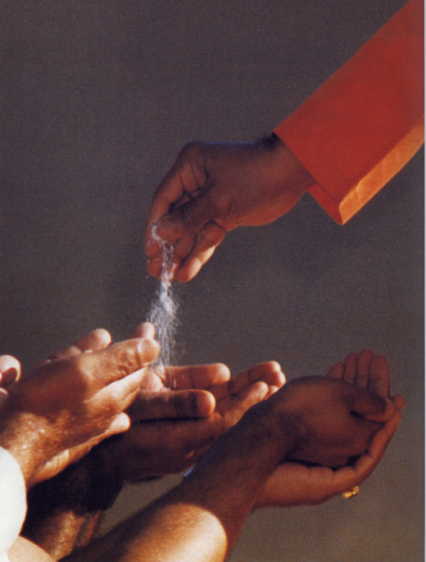
|
|

A cowherd called Maaladhaasa
Sairam,
Prashaanthi Nilayam, 1963
There was a cowherd called Maaladhaasa who was determined to see the Lord as he was described in the sacred texts he had heard expounded in the village temple by a Pandith. So he prayed and prayed to the "black Lord riding on the white bird" all the time his cows were pasturing in the fields. Eleven days passed; but, there was no sign of the "black Lord riding the white bird". He had forgotten to take food and drink during all those days and so he had become weak, too weak to walk or talk.
At last, the Lord melted at his entreaties and presented himself before him as an old Brahmin; but the Brahmin was not riding a white bird nor was he beautifully black as the Pandith had described. So, he asked the Brahmin to come the next day at seven in the morning so that he may bring the Pandith and verify whether he was the Lord Himself. The Pandith laughed at the whole affair and refused to take part in it.
But Maaladhaasa was so importunate that he agreed the entire village turned out on the river bank the next day long before seven o'clock. The Brahmin was there exactly as he had promised and Maaladhaasa showed him to all. But, they could not see him! They began to laugh at the cowherd's antics and threatened him with a severe beating for bringing them along as butts for his joke. Maaladhaasa could see the Brahmin clearly but no one else could. At last, he got so enraged that he walked up to the old Brahmin and gave him a whacking blow on the cheek, saying, "Why don't you show yourself to all?"
That blow changed the entire scene. Krishna appeared in resplendent robes, smiling face, captivating form and the white bird. As the astounded villagers were recovering from the amazement, the Vimaana (heavenly chariot) floated down from the sky and Krishna asked Maaladhaasa to sit inside it. Then, with the Lord by his side Maaladhaasa rose up and soon was out of sight.
Krishna satisfied his hunger with the tiny leaf that Dhroupadhi gave from the cooking vessel. Rukmini balance the weight of him with a thulasi leaf. A handful of flattened rice suffused heavily with the devotion and faith of kuchela's wife brought a good fortune. The lord do not care for the object offered but cares for the motive. The lord will value and appreciate a world of feeling fill in an atom of deed. Many Raajas and Mahaaraajas among whom Krishna moved had not realised the truth but the unlearned simple cowherds and cowherdesses were wiser and were convinced that Krishna was the lord.
The gopees lost all attachment to the world and to the senses and to the manifold objective phenomenal things when they listened to the murali (flute). They yearned for sublimest spiritual merging with the Infinite that was always calling on the finite to realise its finiteness. The lord will not stay in the heart unless it is maintained fixed and unagitated. The cradle must be firm and unmoving when a child is laid in it. But once the child is laid, the cradle can be swung. The lord is also a child personified with sath chith anandha, devoid of gunas (qualities).
The avathaars play a drama within the drama of this universe. The avathaara behaves in a human way so that mankind can feel kinship and the avathaara rises to superhuman heights so that mankind can aspire to those heights. You can understand the meaning of any avathaar only when you become lost to the world and its attachments through the expansion of your sympathies and the purification of your motivies. The nara thathwa (real nature of man) can be transformed into the Naaraayana thathwa (real nature of God) as both are same basically.
The all-pervading Aathmaaraama (divinity) can grasped clearly with no distortion only when you know, adjust and switch on to the particular wave-length. The Aathmaaraama prompts everyone to stick to truth and to the moral code. You have only to listen and obey and get saved. Some hear even its whisperings; some listen only when it protests loudly; some are deaf; some are determined not to hear. There can be no place for doubt if you seek to know the highest and secure the award of the lord. Doubt grows wild in the absence of faith. Faith can be established only when one grasps the inner significance of each incident and remark. One has to seek God just as one seeks food. The heart should be set as the motivator on achieving the task of realising the lord within you.
--SATHY SAI